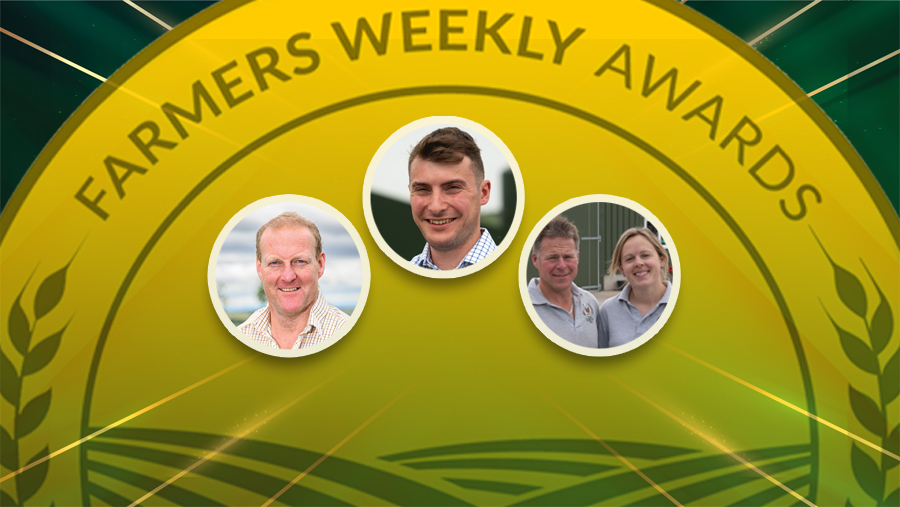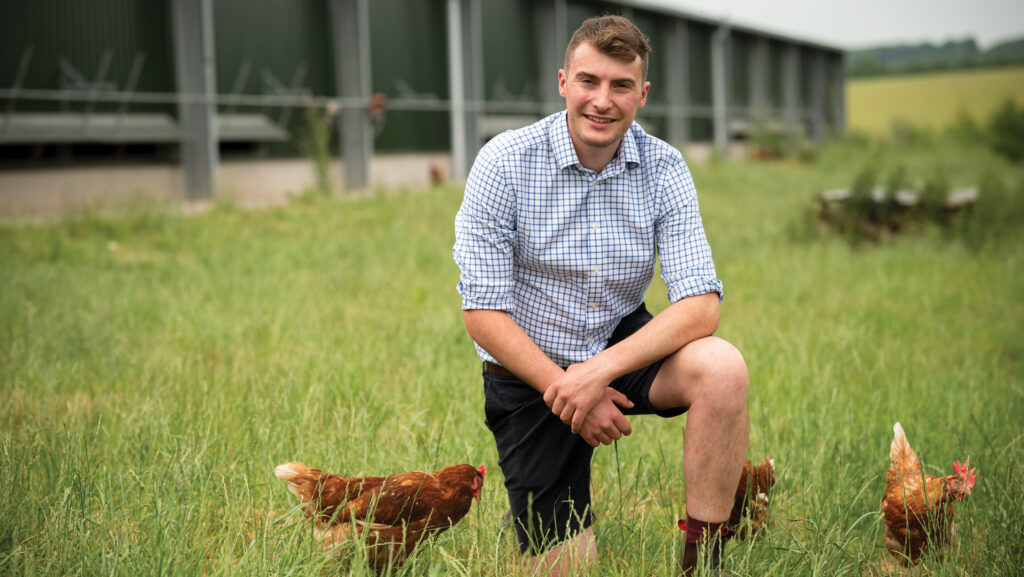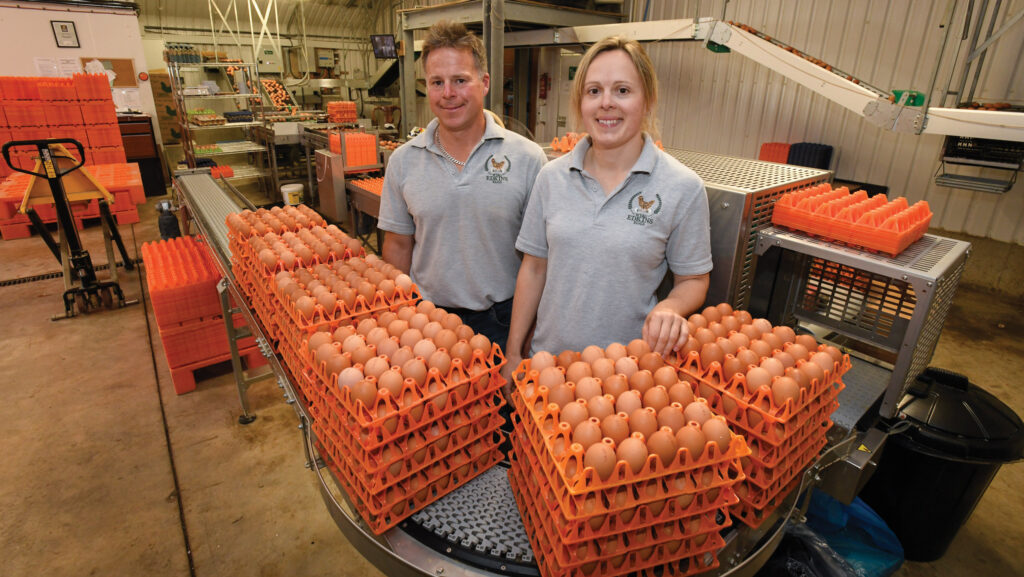FW Awards: Meet the 2025 Poultry Farmer of the Year finalists
 Left to right: Hugh Carter, Ryan Dakin, Ben and Meryl Edkins
Left to right: Hugh Carter, Ryan Dakin, Ben and Meryl Edkins Egg producers dominate this year’s Poultry Farmer of the Year finalists line-up, with three exceptional operators vying for the top spot.
The judges
- Gary Ford With a long career in the poultry sector – both eggs and broilers – Gary is currently head of strategy for the British Free Range Egg Producers Association.
- Chris Wright Last year’s winner, broiler grower Chris from IEC Poultry in Shopshire has a keen eye for detail and a passion for all things poultry.
- Philip Clarke Farmers Weekly’s news editor and former editor of Poultry World, Philip has been judging the poultry category for 15 years.
See also: FW Awards: Meet the 2025 Dairy Farmer of the Year finalists
Hugh Carter, East House Farm, County Durham

Hugh Carter © Richard Lee
As a qualified accountant, it is not surprising to find that Hugh is an egg producer who is on top of his numbers, with data a key factor in the decision-making process.
Farming is very much in his nature too, with his father and grandfather having farmed before him.
But Hugh was always keen to give something else a go first, working for several years as an agricultural accountant.
Returning to the family farm in 2007, Hugh built his first hen house for 16,000 hens, followed by another in 2009, and a third unit in 2013.
But the big step up came in 2024, when he invested in a multi-tier shed for 64,000 birds, complete with an integrated feed mill and a muck drying system, doubling the farm’s capacity to 124,000 free-range laying hens.
Production
Set within 450ha of arable ground, the emphasis is very much on regenerative farming, with all crops produced on the farm – mainly wheat, oats and beans – going to feed the hens.
The manure, which is dried in the new shed and mixed with wetter material from the older sheds, is applied to the land providing good levels of nitrogen, phosphorous and potassium.
“This closed-loop system significantly reduces our carbon footprint,” says Hugh.
Premier Nutrition helps devise the ration for each stage of the flock cycle, with other raw materials such as sunflower and maize gluten bought in.
Overall, Hugh estimates he makes a £15-£40/t saving through mixing his own feed.
Bird performance has held up well, with egg production consistently exceeding breed standards, while consuming 115-118g of feed a bird a day.
An updated vaccination strategy has reduced the use of antibiotics, and mortality averages 3.5%.
Meanwhile, Hugh has focused on extending flock life, with the last flock being depleted at 84 weeks.
“This helps spread the pullet cost and also lowers our carbon footprint per egg.”
One of the flocks of 32,000 hens has now achieved the BSI “carbon neutral” kite mark – in part due to phasing out soya from the ration, but also installing 350kW of solar panels and using home-grown feed and fertiliser to reduce transport emissions.
“By treating the farm as an interconnected system rather than separate enterprises, we have created a business model that is both profitable and future proofed, balancing productivity with sustainability,” says Hugh.
Marketing and social
All eggs produced at East House Farm are sold to Myton Food Group – parent company to Chippendale Food.
The carbon neutral eggs are destined for Morrison’s “Better For Our Planet” brand, capturing a 20p/doz price premium.
Hugh has a close relationship with both the packer and the retailer, one example being when he took part in trials feeding black soldier fly larvae to the hens – a joint initiative with Chippendale, Morrisons and start-up company Better Origin.
To optimise egg quality, Hugh has installed a camera controlled egg belt and photographic grading technology in his newest shed.
He is also passionate about sharing his farming story.
“To bring farming into the classroom, we purchased an incubator and supplied fertilised eggs, allowing pupils to experience the hatching process first-hand,” he says.
Hugh has also appeared on a farming panel at the Great Yorkshire Show to talk about sustainability.
With an eye to the future, he is considering moving into pullet rearing to reduce reliance on external suppliers, and investing in a pelletiser for the manure dryer, to extract additional value.
The judges liked
- A willingness to take a risk and do things differently
- “Closed-loop” egg production system, with low environmental footprint
- Data-driven business with high levels of efficiency
Farm facts
- Free-range egg producer with birds housed on three sites
- Focus on regenerative farming across 450ha of arable
- All grains and pulses home-mixed to feed the hens
- Manure drier to produce nutrient rich organic fertiliser
- All eggs end up in Morrison’s
The numbers
- 7,500 – trees planted
- 7 – bins in feed mill
- 9 – full-time staff
- 0.2 – kg of carbon dioxide per kg of egg
- 89 – % dry matter in manure
What the judges say
“As an ex-accountant, Hugh has developed a profitable business, exercising tight control of costs with good knowledge of data and a willingness to invest.
“An emphasis on sustainability has provided a strong foundation for the business to flourish.”
Ryan Dakin, Manor House Farm, Cheshire

Ryan Dakin © Ioan Said Photography
Cheshire may be a traditional dairy county, and Manor House Farm traditionally a dairy farm, but Ryan Dakin had little doubt that egg production was his future, having been gifted some pet chickens as a boy, and then been inspired by a poultry-mad lecturer at Reaseheath College.
Visits to nearby egg units in North Wales and Shropshire, and a research trip to Denmark in 2019, provided further inspiration and the decision was made to replace the dairy herd with beef animals, and invest more than £1m in a 32,000-bird free-range unit.
Shed construction started during Covid lockdown, with a dividing wall down the middle and popholes leading out onto a 16ha range.
The first flock of 32,000 Lohmann Brown hens arrived in November 2020.
“It was a very steep learning curve – about planning and flock preparation, then about chickens as animals and egg production,” says Ryan.
Production
There is a real emphasis on hen health and welfare at Manor House Farm. The birds are vaccinated for infectious bronchitis every six weeks, and treated for worms every 10 weeks.
“This is done via the feed to ensure better uptake and to prevent interference with water hygiene, which is critical to bird health,” says Ryan.
In an attempt to improve water potability, he uses an organic acid to drop the borehole supply from pH7 to pH4.5, benefiting gut health, improving feather cover and lowering feed intake.
Farming in a nitrate vulnerable zone, manure management is another focus.
A weeping wall lagoon – previously part of the dairy enterprise – has been repurposed to store poultry manure, with a roof built over the top, leading to a drier, more saleable product.
The appearance of red mite provided an early challenge, one that Ryan tackled initially with a knapsack sprayer.
“I soon learned that this is very labour intensive, with mixed success.”
Taking outside advice – something Ryan is always willing to do – the decision was made to switch to using Exzolt in the water, “a much more effective control plan”.
Bird performance is on an upward trajectory. The first flock was depleted at 76 weeks having seen 7.8% mortality and an average 119g a bird a day feed consumption.
By flock three, these figures had improved to 80 weeks, with 3.8% mortality and 117g a bird a day feed intake.
Ryan expects his fourth flock to do even better.
Marketing and social
All eggs are Lion Code and RSPCA assured, being sold to Chippindale Foods on a feed price tracker contract.
“I’m very positive about farm assurance as it raises the bar and makes us do things we might otherwise shy away from,” says Ryan.
Strong profitability, thanks to falling feed prices and a rising egg price, has enabled Ryan to accelerate debt repayments.
He now plans to invest in an automated egg grader, to ensure more second-grade eggs are detected prior to packing.
“This will increase profitability further,” he says.
Having attended the NFU’s Poultry Industry Programme and undertaken the “Farmers to School” training, Ryan is always keen to encourage the next generation.
This has involved visits to a local primary school, and to a local high school, where he talked about careers in agriculture.
He has also attended a careers day at Reaseheath College, hosted farm walks with Malpas Young Farmers, and appeared on TV to explain about avian influenza.
Ever keen to get involved, Ryan is also a member of the NFU North Poultry Board and is the Cheshire NFU poultry representative.
This allows him to contribute to the future development of the industry, while picking up tips for his business.
The judges liked
- Passion for the sector and eager to learn from others
- Strong management and good profits enable rapid debt payback
- Fantastic outreach to schools and the wider public
Farm facts
- 32,000 Lohmann Brown layers in two flocks
- 16ha of ranges on 44ha total land area
- Big Dutchman 284 multi-tier system
- Beef cattle, which also graze on the range
- Involved in agri-environment schemes
The numbers
- 20 – % natural cover on the range
- 60 – Kw of solar panels on shed roof
- 1.2 – hectares of wildflower mix
- 1,400 – trees planted on the range
- 40 – Ranging area in acres
What the judges say
“For a young man, Ryan has already proved himself as an ambassador for the poultry sector, building a profitable egg business from scratch and taking his farming messages to a wider audience. His leadership qualities are admirable.”
Ben and Meryl Edkins, Coed, Ceredigion

Ben and Meryl Edkins © John Eveson
Originally producing suckler beef and sheep with his father, Ben Edkins first went into free-range egg production 10 years ago, when it became clear the small Welsh farm in the Aeron Valley would have to diversify to stay afloat.
Persistent issues with bovine TB had undermined the beef job, triggering the decision to sell the suckler cows and use the money, combined with a bank loan, to build the first 16,000-bird unit – a Powell shed, with Vencomatic equipment and Collinson feed bins.
While the farm still buys in store cattle, Ben found his focus was increasingly on the layers, and so a decision was made to put up a second shed in 2019, to double production in an expanding free-range market.
“Getting planning permission took us about six months – much quicker than for our home,” he says.
Production
Now into the eighth flock, egg production at Coed Farm has gone from strength to strength.
Ben and wife Meryl have tried a number of different breeds, including British Black Tail hens, which were fully beaked and needed careful management.
A change of packer to Fridays in 2024 meant a change to H&N layers, which continue to perform well.
There is an emphasis on extending flock life. “Our first flock went at 72 weeks, which was the industry norm at the time – it was heartbreaking to see them go when they were still on over 80% lay,” says Ben.
The latest flock, he aims to get to 86 weeks. Even at 72 weeks, at the time of the judging visit, the two flocks were still producing at 86% and 87% respectively, consuming 127g and 123g of feed a bird a day.
Disease management is a priority. “We worm every 12 weeks, alternating between the water and the feed, and we give a routine vaccine for IB [infectious bronchitis], which gives us peace of mind,” says Ben.
A vitamin is added to the water to help shell quality, and the birds have access to hay nets, lucerne bales and pecking blocks in the shed.
Ben and Meryl have made considerable investment in solar infrastructure – to the extent that the whole unit, their farm shop and their own house now operate “off grid”.
More than 200kWh of battery storage captures the power from the extensive array of roof panels to drive all the equipment, for a considerable cost saving.
“We actually generate a slight surplus, so rather than waste it, we have bought a new electric delivery van and I even have an electric lawnmower,” says Ben.
Marketing and social
Ben and Meryl have a real focus on the end consumer.
The contract with Friday’s allows them to retain about 10-15% of their eggs, which are packed on the farm and sold locally.
Some are delivered to local shops, restaurants and bakeries.
But two years ago, they also invested in an egg vending machine in the centre of Aberystwyth, selling a range of local produce.
This has proved so successful that, in 2024, they opened a self-service shop on the farm, with the help of an 80% grant.
These two facilities are available 24/7 and bring in good revenue.
“Our customers greatly appreciate the ability to purchase goods at any time of the day or night, as lifestyles have become increasingly busy,” they say.
The boxed eggs are branded as Wyau Edkins Eggs, backed up with a bilingual website and a strong social media presence.
Ben has a keen eye on future development as well, with one possibility being to link up with a local dairy farmer to add to the customer offering.
“We are also thinking of investing in another vending machine,” he says.
With a strong sense of community, the Edkins have also hosted the local Young Farmers Club, though the threat of avian influenza has put a temporary stop on further farm visits.
The judges liked
- Genuine family operation, with all generations involved in the business
- Customer focused – both for direct sales and with the packer
- Always looking for new ways to develop the business
Farm facts
- 92ha owned land, plus 57ha rented land nearby
- Multi-tier free-range egg production, combined with beef finishing unit
- Two flocks of H&N birds
- Contracted to packer Fridays, with direct sales through two vending machines
- Extensive on-roof solar panels and batteries allow whole operation to run “off grid”
The numbers
- 32,000 free-range laying hens
- 232 solar panels on hen house roofs
- 14 miles to town centre egg vending machine
- 3 full-time staff in addition to family labour
- 20ha of ranges for the two flocks
What the judges say
“Good working relationships with both suppliers and the packer provide the foundations for a thriving family business. Excellent customer service and strong branding also ensure healthy margins from the direct sales.”
A word from our sponsor

“Aviagen is honoured to support the Poultry Farmer of the Year award, recognising the outstanding accomplishments of nominees and the excellence within today’s poultry industry.”
Blake Williamson, general manager, Aviagen UK
